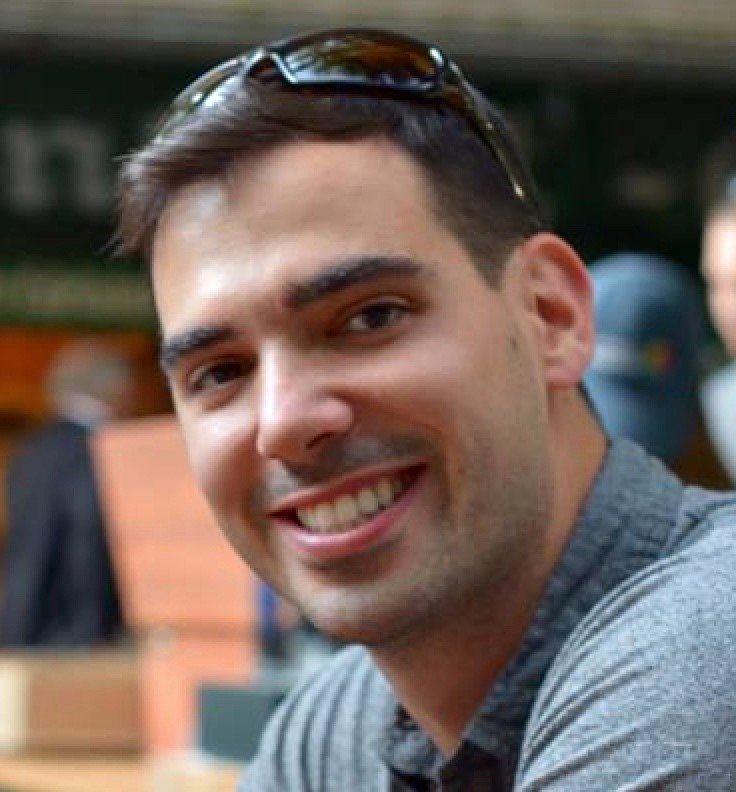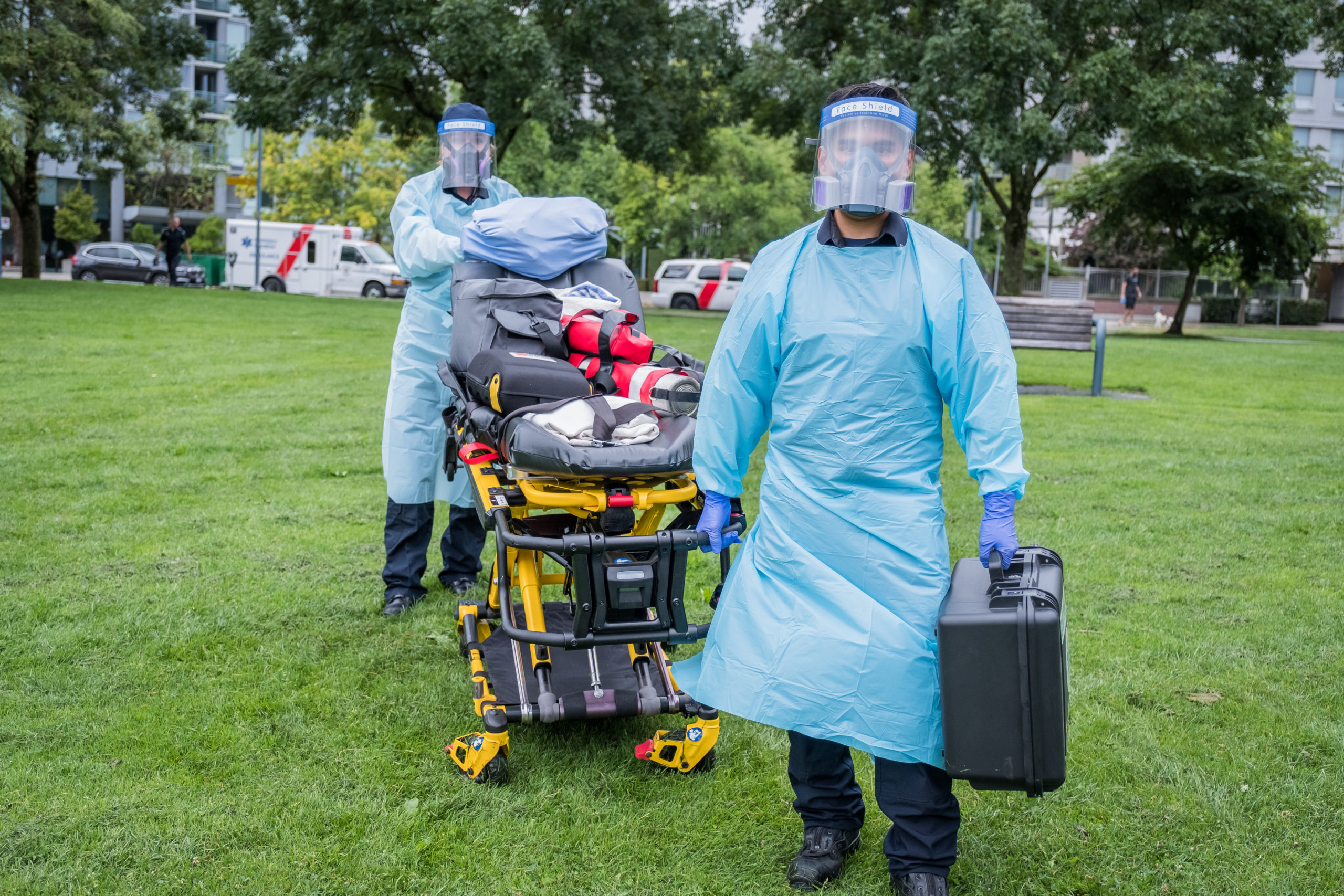The following is a repost of an article first appearing in the July 2023 edition of Canadian Paramedicine, a bimonthly magazine dedicated to publishing articles, research and paramedic news across Canada.
By Scott Haig, Janessa Tom and Christopher MacDonald
Looking back on almost three years of the COVID-19 pandemic, much of it is a blur. But memories of the overwhelming and unforgettable sense of uncertainty, anxiety, and isolation remain. For paramedics and other frontline health care workers, the pandemic placed unprecedented stress on an already strained workforce and system. From the first reported case, paramedics faced the unknown to deliver emergency care to those in need, despite the uncertainty about precautions needed to protect them from COVID-19 exposure.
While we went to work each day without knowing what we might face, we also sought to find answers and solutions to the pandemic through studies like the COVID-19 Occupational Risks, Seroprevalence and Immunity Among Paramedics (CORSIP) research project. This project sought to identify COVID-19–related occupational risks to paramedics and develop recommendations to protect us against the virus. The study became a tangible initiative that empowered paramedics to contribute to addressing the uncertainty of working during the pandemic, and help to answer some of our most pressing questions: How effectively do vaccines prevent infection and illness? If we are infected, what does that mean for our future risk, or for developing long COVID? For many health care workers, we just wanted to know how to avoid bringing this then-mysterious illness into our homes.
Paramedic-supported research projects, like the CORSIP study, continue to improve our understanding of the SARS-CoV-2 virus, better inform how to protect ourselves against infectious diseases, and instigate improvements for paramedic practices.
With the World Health Organization declaring the end of the COVID-19 global emergency earlier this year, the biggest question on many of our minds remains: What did we learn from the pandemic and how can we better prepare ourselves for the future? February 2023 marked the conclusion of CORSIP and our research team has already contributed 14 academic publications to begin to answer some of these questions. This valuable information is the direct result of the continued participation and leadership of Canadian paramedics. Paramedic-supported research projects, like the CORSIP study, continue to improve our understanding of the SARS-CoV-2 virus, better inform how to protect ourselves against infectious diseases, and instigate improvements for paramedic practices. This information will be used for years to come in informing guidelines for future outbreaks and pandemics.
In this article, we will share some of our experiences working on the study and talking to participants, as well as some of the findings from the CORSIP study.
Uncertainty was the only constant

An official public health emergency was announced on March 17, 2020. From that point on, finding effective ways to protect ourselves while still providing the best possible care became a priority. This meant that personal protective equipment (PPE) became even more important. Paramedics rely on PPE as their primary means of protection against exposure to infectious disease agents. Despite this, CORSIP participants recalled that they had difficulties accessing PPE in the first few months of 2020 compared to later in the pandemic. We also found that PPE availability issues were more prevalent among paramedics than other health care workers. The exception to this was when paramedics took it upon themselves to supply their own PPE and re-use it, often without decontamination. Availability of PPE differed both across and within some provinces, adding to the initial confusion and disorganization surrounding how to best protect ourselves (1). These findings highlight the importance of establishing coordinated paramedic infection control recommendations, ongoing PPE caches, and deployment plans for future pandemics.
What else changed? The placement of plastic sheets over patients needing CPR became common practice and advanced practitioners were temporarily restricted from performing life-saving procedures such as intubation. Fear of infection and uncertainty surrounding effective care started to take its toll. Many felt helpless as we tried everything in our power to resuscitate mothers, fathers, sons, and daughters who were failing to breathe. This helplessness dragged on as scientists around the world raced to find treatments and vaccines. With reports of several vaccines approaching the final stages of testing and approval, we began to see a light at the end of the tunnel. Eventually, the development of a vaccine was announced with deliveries starting as early as December 2020 in some provinces. This came with some additional questions, as paramedics were initially unsure if they would be included in the first round of vaccinations. Thanks to the hard work of paramedic leadership, paramedics were among the first group of health care workers to receive the vaccine in many parts of Canada. Funding of the CORSIP project signaled a national acknowledgement that frontline paramedics are an important cohort of workers to study to understand how infectious diseases may be transmitted in the community.
One of the main questions for the CORSIP study was to understand how these vaccines affected the ability of the immune system to fight COVID-19. We started to get underway and enroll paramedics across the country in January 2021. The study required that participants provide blood samples throughout the course of the study, no small ask for paramedics who were now exhausted and overworked. With a large team of research assistants, many of which were also paramedics, we created “Mobile Phlebotomy Clinics” (MPCs) to bring the lab to the paramedic. The team traveled throughout B.C. and Alberta to paramedic stations, making it easier for paramedics to enroll and participate in CORSIP.
Does this thing even work? What we learned about the COVID-19 vaccine

While many paramedics were fortunate enough to receive their first vaccine early, the second dose was a different story. Initially, it was recommended to wait only three to four weeks before getting a second dose. Under the pressure to manage vaccine availability due to global shortages, early decisions to extend that gap to four months was initially criticized as “a population-level experiment.” Amidst this political turmoil, the CORSIP team wanted to address this concern directly. By the end of 2021, we had published two papers describing our findings about optimal dosing intervals to maximize protection against COVID-19 infection (2,3).
By comparing blood samples from paramedics who received a second dose within 4 weeks and those who received a more delayed second dose, we showed that a delayed schedule resulted in a stronger immune response. This supported a delayed strategy that could potentially yield quicker partial protection to a larger proportion of the population while vaccine supplies were limited. We published a follow-up paper in early 2023 showing that a delayed second dose was advantageous, even months after vaccination (4). Our work has since been cited by the US Centers for Disease Control and Prevention in their vaccine guidelines.
On the ground, we started to see evidence that the vaccines were effectively protecting us.
On the ground, we started to see evidence that the vaccines were effectively protecting us. Despite being frequently exposed to positive COVID-19 cases, vaccinated paramedics had similar levels of COVID-19 antibodies (indicating a person had experienced COVID-19) compared to non-paramedic blood donors. In other words, vaccinated paramedics had rates of COVID-19 that were similar to the public. Unvaccinated paramedics, in comparison to blood donors, showed a three-times higher prevalence of prior COVID-19 infection. This suggested that vaccination was mitigating the infection risk attributable to working as a paramedic (5).
As the vaccine became more available and people began to get their second and third doses, we noticed changes in the attitudes of paramedics surrounding COVID-19, vaccination, and the pandemic as a whole. In early 2022, many of the conversations focused on optimism about the effectiveness of the vaccines. The sense of isolation that paramedics and other health care providers had experienced during the first year of the pandemic seemed to be subsiding. Crews reflected on the early days of the pandemic and how terrifying it had been to come into work knowing they were unvaccinated and that there may not even be enough PPE for their shift. Twenty-one months later, paramedics were celebrating being able to spend the holidays with their families without the fear of getting their loved ones sick. At this point, it seemed like things were on the upswing.
A long-lasting legacy: Mental health and wellness during the pandemic

While the pandemic outlook was improving, we noticed the cracks starting to show as the persistent fear, uncertainty, and the cognitive overload of the early pandemic took its toll. People might assume that these circumstances are commonplace for a day in the life of a paramedic, but as the months drew on and clinical directives continued to rapidly charge, a darker cloud of psychological injury appeared to have fallen on the workforce.
Many of us were fortunate enough to have an incredible support system but this was not the case for all of our colleagues. These years have been the hardest of many of our careers, with long-lasting effects felt to this day. By the summer of 2022, and in the thick of one of the most transmissible Omicron waves, there was a noticeable shift in the morale of paramedic crews across Canada. Many paramedics expressed frustration with high rates of turnover, inadequate staffing, and continuous pressure on emergency services. Paramedics described growing cracks in the system related to staffing and mental health support services, but continued to acknowledge the strong sense of camaraderie between colleagues.
…as the months drew on and clinical directives continued to rapidly charge, a darker cloud of psychological injury appeared to have fallen on the workforce.
By January 2023, there appeared to be a decline in morale and 12-hour shifts started to feel like 24. Frankly, paramedics were tired. From the early days of uncertainty when there was no concrete understanding of how the virus spread and we had to isolate from friends and families, to now nearly three years later when the days of constant masking, physical distancing, and ubiquitous hand sanitizer had largely subsided in the general public, paramedics still faced daily reminders of the pandemic. There was no reprieve.
Our study surveys showed significant reductions in life satisfaction, mental health, physical health, and ability to cope with stress at work and at home among the majority of paramedics. Concerningly, about one-third of paramedics met the screening criteria for clinical depression, and nearly one in ten reported suicidal thoughts. Two out of every five paramedics screened positive for post-traumatic stress disorder (PTSD). Female paramedics and those with underlying mental disorders were at elevated risk. Interestingly, this risk of PTSD did not change due to the pandemic, suggesting that paramedics did not perceive the pandemic as a traumatic incident that would typically be associated with the development of the disorder. We found that incidence of PTSD symptoms increased when paramedics withheld treatment as the result of fear of exposure to COVID-19, versus withholding treatment due to clinical directives alone (6). It’s clear that there are wounds that still need to heal, and change is needed to prevent future trauma.
What does it all mean?
The completion of data collection for this study was the end of a marathon project. It was extremely fulfilling to have worked with such an incredible group of dedicated colleagues and friends. Each person — paramedics, unit chiefs, managers, directors — were amazingly supportive and dedicated throughout the pandemic years and deserve tremendous recognition.
While there is much more information to be mined from this study, it’s clear we need more care and attention toward mental health support among paramedics. Paramedic services need to set their employees up for success and safety; providing adequate resources for mental health care access is a necessity. Approaches to deal with PPE shortages and bioaerosol exposure risk must be considered for future pandemics. While our results show that investments in infection prevention and control practices were made early in the pandemic, a standardized approach is needed for paramedic services (7). We should no longer be adopting the recommendations for health care workers that practice outside of the prehospital care setting.
The amount of engagement and buy-in from paramedics was integral to the success of the CORSIP study, and has proven that paramedics can mobilize to run research projects and contribute to scientific discourse. We are also starting to get a clearer picture of how to best understand who is at greatest risk of infection by respiratory diseases like COVID-19, and different ways of measuring risk (8). It is our hope that this article, and our other publications, inspire curiosity among paramedics and motivate future research questions and participation.
While we are no longer in the thick of a global pandemic, we’ve learned lessons that will contribute to the improvement of paramedic services and will remain immortalized in the data and outcomes from the CORSIP study. Looking forward, we see a future rich with opportunities to not only engage paramedics in participating in research, but also have them at the helm of the design, administration, and execution of research projects.
The CORSIP study was led by Drs. Brian Grunau and David Goldfarb at the University of British Columbia, and Drs. Tracy Kirkham and Paul Demers at the University of Toronto. If you would like further information about the CORSIP study, please visit https://omc.ohri.ca/CORSIP/ or contact communications@advancinghealth.ubc.ca.
Scott Haig is a Primary Care Paramedic and serves as the Acting Unit Chief for UBC Station 262. Within B.C., he was the lead paramedic on the CORSIP study team, taking a central role in the coordination and implementation of sample collection in B.C. and Alberta. (Photo credit: BCEHS/PHSA media)
Janessa Tom is a project coordinator within BC Emergency Health Services and recently completed her Emergency Medical Responder (EMR) training. She is a UBC research assistant and traveled across western Canada to enroll paramedic participants for the CORSIP study.
Christopher MacDonald is a Senior Policy Advisor overseeing Ontario’s Community Paramedicine for Long-Term Care (CPLTC) program. Prior to that, he spent a decade working as a paramedic for various services in the Greater Toronto Area. He is on the home stretch of completing his PhD in Occupational and Environmental Health at the University of Toronto, for which the CORSIP project informs the bulk of his dissertation and publications.
References
- Eros FP, Qazilbash H, MacDonald C, Demers PA, Grunau B, et al. Personal protective equipment use and availability during the COVID-19 pandemic amongst paramedics in Canada compared to other healthcare workers. Poster presentation. Canadian Association for Research on Work and Health 2022. 2022 Sep 14-16.
- Grunau B, Asamoah-Boaheng M, Lavoie PM, Karim ME, et al. A Higher Antibody Response Is Generated With a 6- to 7-Week (vs Standard) Severe Acute Respiratory Syndrome Coronavirus 2 (SARSCoV- 2) Vaccine Dosing Interval. Clinical Infectious Diseases. 2022 Jul; 75(1):e888-91.
- Grunau B, Goldfarb DM, Asamoah-Boaheng M, Golding L, Kirkham TL, et al. Journal of the American Medical Association. 2021 Dec;327(3):279-81.
- Asamoah-Boaheng M, Goldfarb DM, Prusinkiewicz MA, Golding L, Karim ME, et al. Determining the optimal SARS-CoV-2 mRNA vaccine dosing interval for maximum immunogenicity. Cureus. 2023 Jan;15(1):e34465.
- Grunau B, O’Brien SF, Kirkham TL, Helmer J, Demers PA, et al. A Prospective Observational Cohort Comparison of SARS-CoV-2 Seroprevalence Between Paramedics and Matched Blood Donors in Canada During the COVID-19 Pandemic. Annals of Emergency Medicine. 2022 Jul;80(1):38-45.
- MacDonald C, Demers PA, Grunau B, Goldfarb D, O’Neill D, et al. Mental Health and Life Satisfaction Among Canadian Paramedics During the COVID-19 Pandemic. Poster presentation. Occupational and Environmental Medicine. 2021 Nov;78(S1):a117.
- MacDonald C, Demers PA, Grunau B, Goldfarb D, O’Neill D, et al. Changes to infection prevention and control (IPAC) practices used by Canadian paramedics in response to COVID-19. Oral presentation. Canadian Association for Research on Work and Health 2022. 2022 Sep 14-16.
- Asamoah-Boaheng M, Goldfarb DM, Karim ME, O’Brien SF, Wall N, et al. The relationship between anti-spike SARS-CoV-2 antibody levels and risk of breakthrough COVID-19 among fully vaccinated adults. Journal of Infectious Diseases. 2022 Oct;277(3):339-43.



